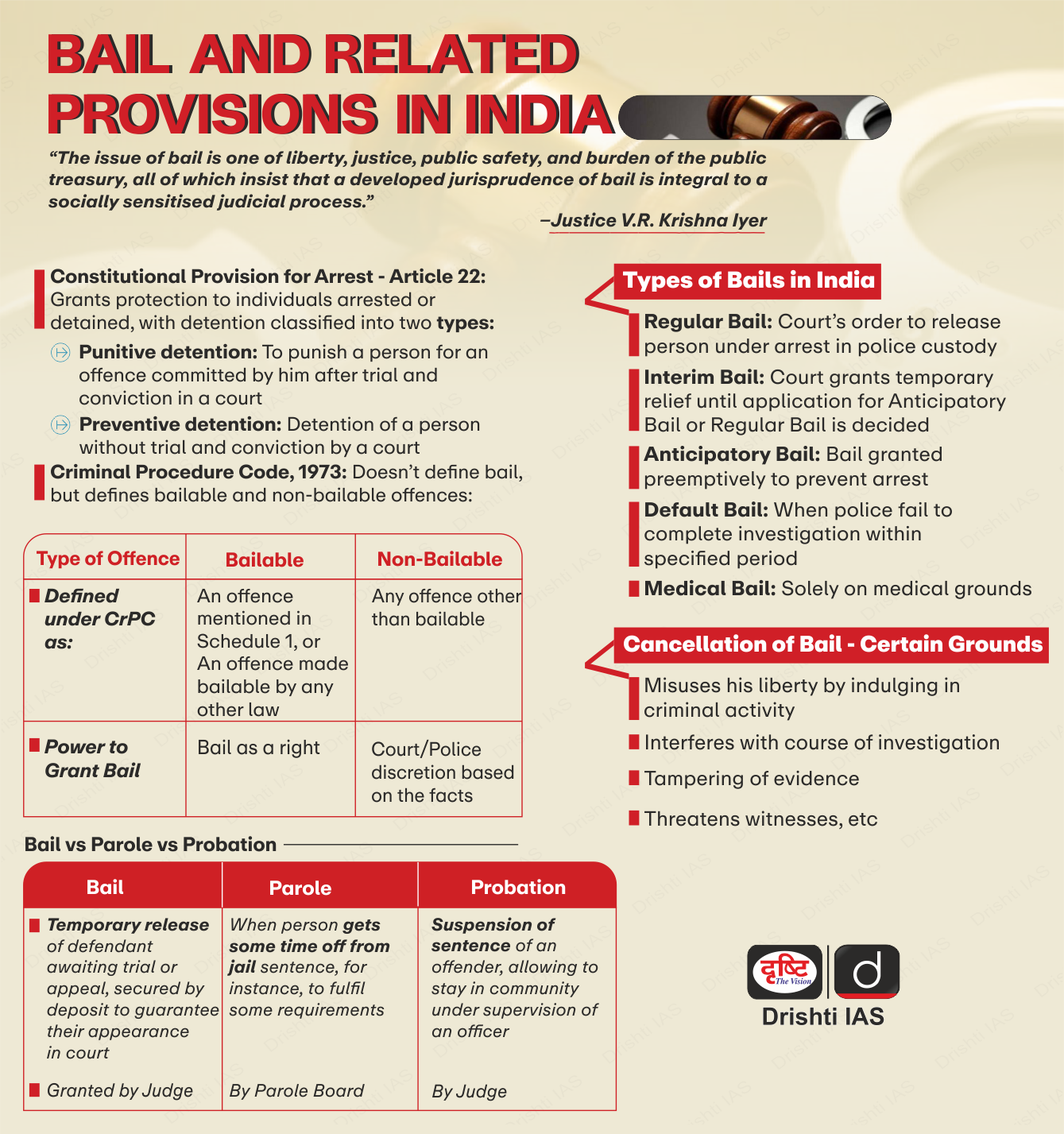Facts for UPSC Mains
Bail Conditions in India
- 03 Sep 2025
- 6 min read
Why in News?
The US President Donald Trump signed an executive order cutting federal funds to jurisdictions that allow cashless bail. The move has sparked renewed discussions on bail reforms in India.
- Cashless bail allows release in minor offences without monetary deposit, subject to conditions for court appearance, unlike traditional bail which requires cash or property surety.
What are the Bail Conditions in India?
- Bail in India: Bail is the conditional release of an accused before trial, based on the presumption of innocence. It ensures the person does not abscond, tamper with evidence, or influence witnesses.
- Chapter 35 of the Bhartiya Nagarik Suraksha Sanhita (BNSS), 2023, which replaced the Code of Criminal Procedure (CrPC) 1973, lays down the bail process.
- Bond: A written promise by the accused to appear for trial and follow bail conditions. It usually requires a cash deposit (amount based on crime and economic condition).
- Cash deposit can be forfeited if bail conditions are broken. It is refundable at the end of the trial, regardless of the outcome.
- If the accused cannot pay immediately, the court may allow release on a Personal Recognisance (PR) Bond, with time given to arrange the cash.
- Bail Bond: A bail bond is a guarantee from a third party (family, friend, or employer) ensuring the accused complies with bail conditions and appears for trial.
- The surety may deposit a sum forfeitable if the accused absconds. Courts verify the surety’s documents, finances, and residence, with some requiring a solvency certificate.
What is the Need for Bail Reforms in India?
- Financial Inequality and Discrimination: Cash and surety-based bail disproportionately affects poor and marginalized groups. Many undertrials cannot arrange money, property, or local sureties, even for minor offences.
- Law Commission (268th report) notes this violates constitutional principles of equality and fair trial.
- Flawed assumptions that all accused have access to financial or social resources render the “bail, not jail” principle ineffective.
- Weak Procedural Safeguards: Courts often fail to follow guidelines for timely bail or to record reasons for denial. Lack of standardized procedures creates arbitrariness in granting or denying bail.
- Delays in Judicial Processes: Backlog of cases and overburdened courts cause prolonged pre-trial detention. Delays result in undertrials being jailed longer than the potential sentence for their alleged offence.
- Nearly 70% of India’s prison population are undertrials, many of whom remain incarcerated for months or years before trial.
- Constitutional and Human Rights Violation: Bail practices must align with Articles 21 (Right to Life and Liberty) and 14 (Equality before Law).
- Excessive pre-trial detention violates the principle of presumption of innocence.
What Measures can Strengthen India’s Bail System?
- Timely Disposal of Bail Applications: Implement strict timelines for granting bail to prevent unnecessary pre-trial detention.
- In the case of Satender Kumar Antil v. CBI (2022) SC emphasized that “bail not jail” should be the norm and highlighted the need for timely processing.
- Incentivize non-custodial measures such as reporting conditions or monitoring mechanisms. It helps decongest prisons and prevents repeat criminalization.
- Financial Assistance for Underprivileged Accused: Expand schemes like Support to Poor Prisoners (2023) to provide funds for those unable to furnish bail.
- Reduces disproportionate incarceration of the poor, aligning with Article 21.
- Expand Use of Personal Recognisance: Encourage PR bonds or non-monetary conditions for minor and non-violent offences. It ensures liberty without financial barriers while maintaining accountability.
- Strengthening Legal Aid and Procedural Safeguards: Streamlined bail processes can reduce overcrowding, uphold constitutional rights, and prevent the criminalization of poverty.
- Deploy para-legal volunteers and lawyers to assist undertrials in navigating bail processes.
- In Madhav Hayawadanrao Hoskot v. State of Maharashtra (1978), the SC held that the right to counsel is a fundamental right under Article 21. Providing legal aid is the State’s duty, not an act of charity.
- Digital and Administrative Reforms: Maintain centralized digital records of bail, sureties, and undertrials. Facilitate quick verification of bonds or sureties to avoid delays like those in Mumbai courts due to solvency certificates.
|
Drishti Mains Question: Q. “Bail, not jail”: Discuss the constitutional and human rights implications of India’s current bail system. |
UPSC Civil Services Examination, Previous Year Question (PYQ)
Prelims
Q. With reference to India, consider the following statements: (2021)
- When a prisoner makes out a sufficient case, parole cannot be denied to such prisoner because it becomes a matter of his/her right.
- State Governments have their own Prisoners Release on Parole Rules.
Which of the statements given above is/are correct?
(a) 1 only
(b) 2 only
(c) Both 1 and 2
(d) Neither I nor 2
Ans: (b)







